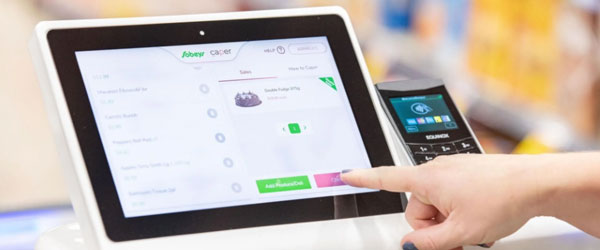SAN FRANCISCO—Instacart said it has acquired Caper AI, a startup tech company that makes smart grocery carts, including ones trialed by Kroger, and rivals Amazon’s Dash Cart and A2Z Smart Technologies’ Cust2Mate smart carts as it seeks to enhance the in-store and online shopping experience.
Caper’s AI cart allows customers to shop a store using the cart, and through cameras and weight sensors, it identifies what products are in the cart. A touchscreen produces a list of what customers have gathered, and then they can pay through the built-in pay terminal. Customers can even create an online shopping list and look through recipes before they arrive at the store, and the AI cart allows them to check off their list as they go.
Instacart, which has delivery partnerships with 7-Eleven, Jacksons Food Stores and other convenience retailers, says it “aims to help retailers unify the in-store and online shopping experience for customers, supporting their businesses no matter how customers choose to shop.”
Earlier this year, Kroger adopted the cart in some of its stores. Kroger recently partnered with Instacart to offer customers 30-minute delivery on fresh food, household essentials, meal solutions and snacks.
Instacart CEO Fidji Simo says COVID-19 has forever changed the way consumers shop, reports the Wall Street Journal. While Instacart’s mega increase in business driven by the pandemic has eased, many consumers are not going back to in-person grocery store shopping. Online grocery sales currently make up about 10% of grocery sales, and Instacart expects that number to reach 30% over the next several years. Research firm Cowen Inc. believes that online grocery sales will reach 20% of total grocery sales by 2025, compared to just 5% in 2019.
Grocery stores are finding grocery delivery expensive to run due to labor costs and shortages, as well as transportation expenses. So, delivery services such as Instacart are appealing to grocery stores to enable grocers to offer delivery without the overhead. However, many grocers don’t make a profit when they use Instacart due to a commission on each order. Another concern for grocers is data. As with any third-party delivery service, Instacart is gathering valuable data on the customer, and grocers lose out on that data.
Convenience stores face a dilemma when decided whether or not to offer delivery services to their customers. NACS Magazine explored the trade-offs between own-staff versus third party in the mobile order and delivery landscape.
Credit: Source link



















